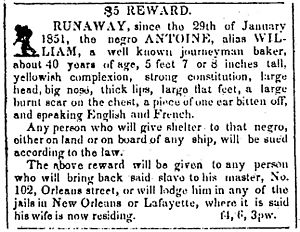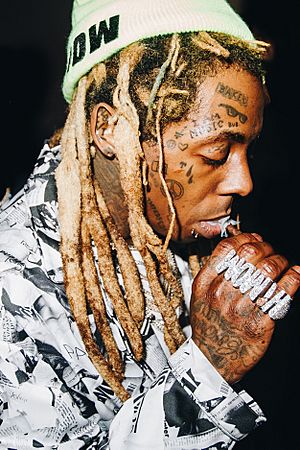African Americans in Louisiana facts for kids
| Total population | |
|---|---|
| 1,572,573 (2017) | |
| Regions with significant populations | |
| New Orleans, Baton Rouge, Shreveport, Monroe, Lafayette, Lake Charles, Alexandria, Houma-Thibodaux | |
| Languages | |
| Southern American English, African American Vernacular English, Louisiana Creole, Louisiana French, New Orleans English | |
| Religion | |
| Christianity (Predominately Protestantism and Roman Catholicism), Atheism, Louisiana Voodoo | |
| Related ethnic groups | |
| Black Southerners, African Americans, African Americans in France, French Americans, Louisiana Creole people, Cajuns, Redbones, Creoles of color |
African Americans in Louisiana or Black Louisianians are people living in Louisiana who have African roots. They are an important part of the state's history and culture.
The first African people arrived in Louisiana as slaves. They were forced to work on large farms called plantations. These farms grew crops like indigo and sugarcane.
Louisiana has a very large African American population. It is the fifth largest in the United States. In fact, Louisiana has the second highest percentage of African Americans in the country. Only Mississippi has a higher percentage. In 2020, about 32.8% of Louisiana's population was African American.
Contents
History of Black Louisianians
The first enslaved Africans came to Louisiana in 1719. This was just one year after the city of New Orleans was founded. Many slave ships brought people from Africa to French Louisiana. Most of these ships arrived before 1730.
Between 1723 and 1769, most enslaved Africans came from areas like modern-day Senegal and the Congo region. Many were from the Wolof and Bambara groups. Places like Saint-Louis and Goree Island were common departure points.
When Spain controlled Louisiana (1770-1803), more enslaved people came from the Congo and Senegal. They also brought people from modern-day Benin. Many of these were from the Nago people, a group related to the Yoruba.
Enslaved Africans brought their cultures with them. This included their languages, beliefs, and traditions. These traditions were important in forming Louisiana Voodoo. Later, many Afro-Haitians also moved to Louisiana. They added to the Voodoo traditions in the state.
Before the American Civil War (1861-1865), African Americans made up most of Louisiana's population. Most were enslaved. They worked on sugar cane and cotton plantations.
In the early 1900s, many African Americans left Louisiana. This was part of a movement called the Great Migration. They moved to other states to find better jobs and more opportunities.
During the 2020 COVID-19 pandemic, African Americans in Louisiana were greatly affected. They experienced a higher rate of illness and death compared to other groups.
Louisiana Creoles are people with a mix of French, Spanish, Native American, and African American backgrounds. Creoles of color are Creoles who have African ancestry. They often share in Black culture.
Colleges for Black Students
Louisiana is home to six historically black colleges (HBCU). These schools were created to provide higher education for African American students. The Southern University System is special. It is the first and only HBCU college system in the United States.
Louisiana's Rich Culture
African Americans have had a huge impact on Louisiana's culture. This includes its music, food, and traditions. For example, many New Orleans dishes like gumbo were influenced by African slaves.
African slaves also brought Louisiana Voodoo to the state. This is a spiritual tradition. African Americans have also shaped Louisiana's music. They helped create famous styles like jazz, blues, hip hop, R&B, Zydeco, and Bounce music.
Notable People from Louisiana
- Lil Wayne, musician
- Anthony Mackie, actor
- Tyler Perry, actor
- Madam C. J. Walker, entrepreneur
- Louis Armstrong, trumpeter
- Bill Russell, basketball player
- Randy Jackson, bassist
- YoungBoy Never Broke Again, rapper
- Kevin Gates, rapper
- Johnnie Cochran, lawyer
- Clyde Drexler, former professional basketball player
- Mahalia Jackson, singer
See Also
- History of Louisiana
- Culture of Louisiana
- Music of Louisiana
 | Isaac Myers |
 | D. Hamilton Jackson |
 | A. Philip Randolph |



